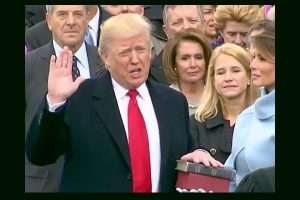Trump’s Stormy Denial: Truth, Or ‘Truthful Hyperbole’?
 WASHINGTON – “If I told the real stories of my experiences with women, often seemingly very happily married and important women, this book would be a guaranteed best-seller.” – Donald Trump, The Art of the Comeback, 1997.
WASHINGTON – “If I told the real stories of my experiences with women, often seemingly very happily married and important women, this book would be a guaranteed best-seller.” – Donald Trump, The Art of the Comeback, 1997.
Prior to becoming a politician (something Trump wrote in the same book quoted above that he was “too honest, and perhaps too controversial to be”), Donald Trump was never one to be shy about boasting of his many affairs and flings with various women, both as a single and married man.
“Oftentimes when I was sleeping with one of the top women in the world, I would say to myself, thinking about me as a boy from Queens, ‘Can you believe what I am getting?’,” Trump wrote in another book, Think Big: Make It Happen in Business and Life – or, if you prefer, its original title, Think Big and Kick Ass: In Business and in Life.
As President, however, Trump appears to be less inclined to wax poetic about his sexual prowess, to the point where he’s now denying the sort of dalliances he once reveled in – and rebuffing such stories with particular vigor when the affair involves a porn star and an allegation of hush money paid.
“President Trump once again vehemently denies any such occurrence as has Ms. Daniels,” said Trump Organization attorney Michael Cohen – the same attorney who is alleged to have arranged the payment to Stormy Daniels – in a statement to the Wall Street Journal. “This is now the second time that you are raising outlandish allegations against my client. You have attempted to perpetuate this false narrative for over a year; a narrative that has been consistently denied by all parties since at least 2011.”
More details have emerged since Cohen released statement, including reports of a previously unpublished interview with Daniels about the alleged affair, conducted back in 2011 by In Touch magazine.
If Trump were not President, I suspect he’d be lashing out at Daniels with a few of his trademark tweets – not to deny the affair, but to dispute Daniels’ less than glowing review of his prowess as a lover.
“[The sex] was textbook generic,” Daniels is quoted as saying. “I actually don’t even know why I did it, but I do remember while we were having sex, I was like, ‘Please, don’t try to pay me.’”
It doesn’t take a lot of imagination to picture Trump dismissing such comments as outrageous lies from a rejected lover who wanted nothing more than to become the next Mrs. Donald Trump, just vindictive musings from another “hater.”
Is the story of Trump’s affair with Daniels true? I have no idea. Among other things, I don’t know anything about Stormy’s credibility, good or bad, and while I’m inherently skeptical of people who peddle their stories to the press for money, I’m also skeptical of people who pay hush money, then say there was nothing to the story they paid to shut down.
What I do know is when it comes to Trump’s statements, whether boastful or disclaiming of his past affairs, it’s hard for me to take at face value anything which comes from the mouth of someone who has proudly termed many of his own statements to be “truthful hyperbole.”
“The final key to the way I promote is bravado,” Trump famously wrote in The Art of the Deal. “I play to people’s fantasies. People may not always think big themselves, but they can still get very excited by those who do. That’s why a little hyperbole never hurts. People want to believe that something is the biggest and the greatest and the most spectacular. I call it truthful hyperbole. It’s an innocent form of exaggeration – and a very effective form of promotion.”
While it may be true that exaggerating is a very effective form of promotion, what it isn’t is an effective means of building meaningful credibility. And as Trump found out in a libel case he filed against Timothy O’Brien, the author of TrumpNation: The Art of Being the Donald, there are times and places when an objective measure of one’s credibility is an important factor – even if it wasn’t when he was out on the campaign trail.
When Trump sued O’Brien, one of the things he alleged was O’Brien had relied on false statements by three confidential sources – sources Trump also alleged O’Brien had fabricated (sound familiar?) – who disputed Trump’s own assessment of his net worth.
As the appellate court noted in its decision upholding a lower court’s dismissal of Trump’s suit, however, Trump’s own statements about his net worth were anything but consistent, which made it impossible to determine with any certainty which of his claims these sources were contradicting in the first place.
“[I]t is indisputable that Trump’s estimates of his own worth changed substantially over time and thus failed to provide a reliable measure against which the accuracy of the information offered by the three confidential sources could be gauged,” the court wrote, and followed with an exchange from Trump’s deposition in the case which the court said was “illustrative of this point.”
It’s worth quoting the exchange at length, as it underscores the difficulty in assessing the truth of Trump’s statements on anything, even when he’s under oath.
Attorney: Now, Mr. Trump, have you always been completely truthful in your public statements about your net worth of properties?
Trump: I try.
Attorney: Have you ever not been truthful?
Trump: My net worth fluctuates, and it goes up and down with markets and with attitudes and with feelings, even my own feelings, but I try.
Attorney: Let me just understand that a little bit. Let’s talk about net worth for a second. You said that the net worth goes up and down based upon your own feelings?
Trump: Yes, even my own feelings, as to where the world is, where the world is going, and that can change rapidly from day to day. Then you have a September 11th, and you don’t feel so good about yourself and you don’t feel so good about the world and you don’t feel so good about New York City. Then you have a year later, and the city is as hot as a pistol. Even months after that it was a different feeling. So yeah, even my own feelings affect my value to myself.
Attorney: When you publicly state what you’re worth, what do you base that number on?
Trump: I would say it’s my general attitude at the time that the question may be asked. And as I say, it varies.
So, is Trump telling the truth when he denies having an affair with Stormy, or Is this one of those instances in which he “tries” to tell the truth, but merely offers a ‘truth’ which may vary depending on his feelings at that moment?
Who knows; maybe someday he’ll write a book about it.
Image: Donald J. Trump taking the oath of office during his swearing-in as 45th U.S. President. (Official White House photo, Jan. 20, 2017.)













